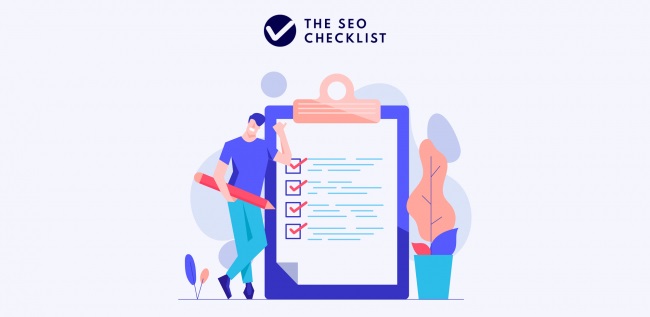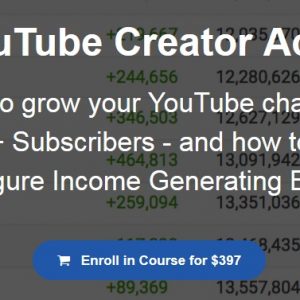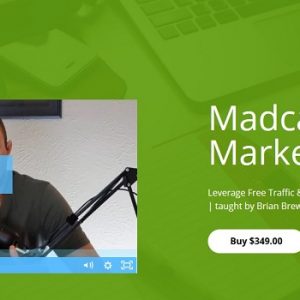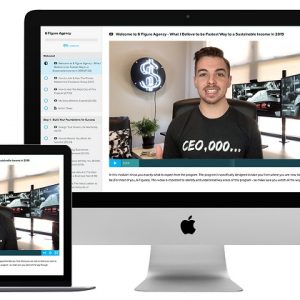[DOWNLOAD] Madalin Tudose – The SEO Checklist
$35.00
The SEO ChecklistTM is your highly-efficient, step-by-step SEO framework that will guide you through actionable strategies you can use RIGHT AWAY to dramatically increase the ranking of your website and bring it where it belongs: on the 1st page of Google!
What You Get:
- 1 Set Up Google Analytics
- 2 Set Up Google Search Console
- 3 Install an SEO Solution for Your Website
- 4 Set Up Uptime Monitoring
- 5 Set Up Keyword Rank Tracking
- 6 Check for About, Contact, Privacy Policy and TOS Pages
- 7 Check for Pretty Permalinks
- 8 Check the Site is Mobile Friendly
- 9 Check the Site Loads Fast
- 10 Keep URLs Short
- 11 Check and Optimize Your 404 Page
- 12 Make it Easy to Share Your Content
- 13 Claim Your Brand on Multiple Social Networks
- 14 Use Heatmaps to See What Users Actually See
- 15 Use a Top-Performing Web Host
- 16 Check The Server is Located Close to Your Service Area
- 17 Use a CDN
- 18 Check for GZIP Compression
- 19 Check for HTTP/2
- 20 Use a Caching Solution
- 21 Minify JS/CSS Files
- 22 Resize Large Images at Upload
- 23 Compress and Optimize images
- 24 Lazy Load Images & Iframes(YouTube embeds, etc)
- 25 Update Technology
- 26 Optimize Database
- 27 Switch to Https
- 28 Check for One Single www Version
- 29 Fix mixed content
- 30 Create a Sitemap & Add it to Google Search Console(GSC)
- 31 Create a robots.txt File
- 32 Check that URLs have redirects to / or the canonical is set to /
- 33 Check and Fix Broken Links
- 34 Check and Fix Redirect Chains
- 35 Fix Missing and Duplicate Meta Titles and Descriptions
- 36 Use Redirects Properly
- 37 Check for Index Coverage Issues
- 38 Check for Manual Penalties
- 39 Keep Pages at Maximum 3 Clicks from Reach
- 40 Use “noindex” and “nofollow” Tags Properly
- 41 Disable Irrelevant Content from Being Indexed
- 42 Do Keyword Research
- 43 Have a Solid SEO Content Strategy
- 44 Create Long-Form Content
- 45 Create 10x Content
- 46 Identify & Fix Keyword Cannibalization
- 47 Identify & Fix Duplicate Content
- 48 Create Content Hubs
- 49 “Feed” the Hubs with Supporting Content
- 50 Update Content on a Regular Basis
- 51 Add Content to Your Categories
- 52 Build Up E-A-T
- 53 Write for People, not for Search Engines
- 54 Check the Target Keyword Matches User Intent
- 55 Have the target keyword in URL, Title and Heading
- 56 Use Focus Keyword in 1st Paragraph
- 57 Use a Single H1 on Each Page
- 58 Set an Enticing, yet SEO-Oriented Meta Title
- 59 Write a Compelling Meta Description
- 60 Use Subheadings for Content Hierarchy
- 61 Format and Style the Content Properly
- 62 Link to Relevant Inner Pages(Internal Linking)
- 63 Link out to Relevant, Authoritative Websites
- 64 Never Link to a Page/Website with the Same Anchor the Current Page is Targeting
- 65 Name Your Images Properly
- 66 Set Images Alt Text
- 67 Check for Social Markup
- 68 Check Dwell Time and Optimize It
- 69 Strike for the Featured Snippet
- 70 Don’t Over-Optimize
- 71 Have a Solid Link Building Strategy
- 72 Build Foundational Links
- 73 Interlink Social Networks
- 74 Guest Post on Niche-Related Blogs
- 75 Ask Partners you’ve Worked with for a Link
- 76 Turn Brand Mentions into Links
- 77 Use Social Signals to Boost your Page Rankings
- 78 Schedule Social Posting
- 79 Claim your Google My Business Listing
- 80 Claim Your Yelp Listing
- 81 Claim your Bing Places for Business Listing
- 82 Optimize Listings
- 83 Get on General Relevant Directories
- 84 Get on Niche-specific Directories
- 85 Reply to Reviews
- 86 Reach Out for Reviews
- 87 Publish Google Posts
- 88 Check for Site-wide NAP Details
- 89 Have Consistent NAP Details Across the Site
- 90 Have Consistent NAP Details on Listings & Social Networks
- 91 Have a Content Strategy Targeting Local Topics
- 92 Claim Brand Mentions from Local Sites
- 93 Add Local Business Markup to your Homepage
Sales Page:_https://theseochecklist.heightsplatform.com/
Related products
$85.00
Sale!
Marketing
Sale!











